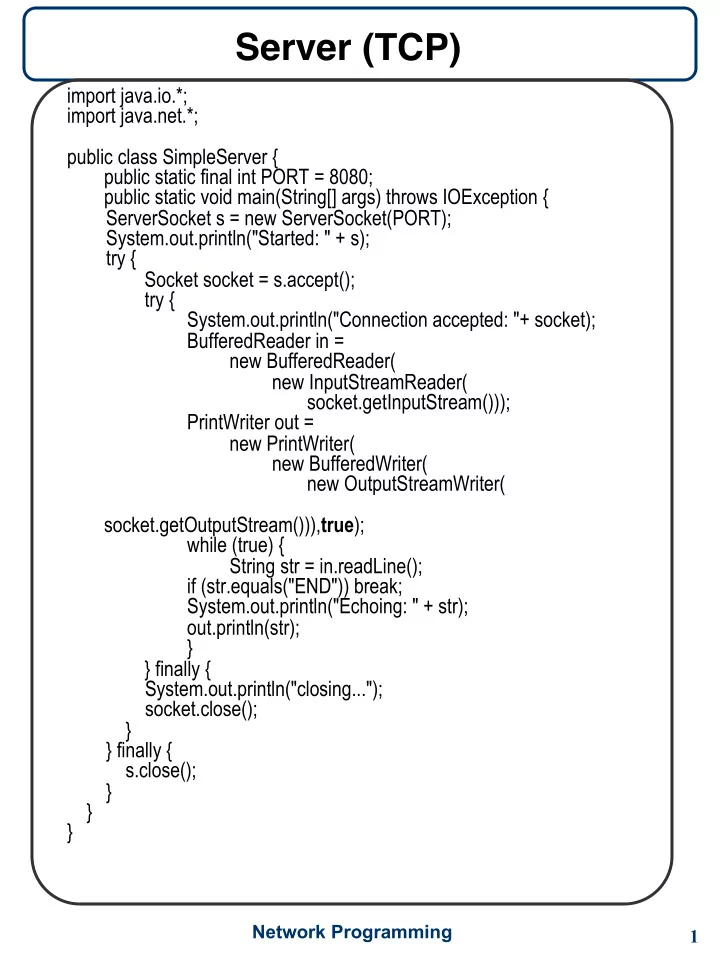

Server (TCP) � import java.io.*; import java.net.*; public class SimpleServer { public static final int PORT = 8080; public static void main(String[] args) throws IOException { ServerSocket s = new ServerSocket(PORT); System.out.println("Started: " + s); try { Socket socket = s.accept(); try { System.out.println("Connection accepted: "+ socket); BufferedReader in = new BufferedReader( new InputStreamReader( socket.getInputStream())); PrintWriter out = new PrintWriter( new BufferedWriter( new OutputStreamWriter( socket.getOutputStream())), true ); while (true) { String str = in.readLine(); if (str.equals("END")) break; System.out.println("Echoing: " + str); out.println(str); } } finally { System.out.println("closing..."); socket.close(); } } finally { s.close(); } } } Network Programming 1
Client (TCP) � import java.net.*; import java.io.*; public class SimpleClient { public static void main(String[] args) throws IOException { InetAddress addr = InetAddress.getByName(null); System.out.println("addr = " + addr); Socket socket = new Socket(addr, SimpleServer.PORT); try { System.out.println("socket = " + socket); BufferedReader in = new BufferedReader( new InputStreamReader( socket.getInputStream())); PrintWriter out = new PrintWriter( new BufferedWriter( new OutputStreamWriter( socket.getOutputStream())), true ); for(int i = 0; i < 10; i ++) { out.println( “ ciao " + i); String str = in.readLine(); System.out.println(str); } out.println("END"); } finally { System.out.println("closing..."); socket.close(); } } } Network Programming 2
Classe Dgram � import java.net.*; public class Dgram { static DatagramPacket toDatagram(String s, InetAddress destAddr, int destPort) { byte[] buf = s.getBytes(); return new DatagramPacket(buf, buf.length, destAddr, destPort); } static String toString(DatagramPacket p) { return new String(p.getData(), 0, p.getLength()); } } Network Programming 3
Server (UDP) � import java.net.*; import java.io.*; import java.util.*; public class DgramServer { static final int INPORT = 1711; public static void main(String[] args) { byte[] buf = new byte[1000]; DatagramPacket dp = new DatagramPacket(buf, buf.length); DatagramSocket socket; try { socket = new DatagramSocket(INPORT); System.out.println("Server started"); while(true) { socket.receive(dp); String rcvd = Dgram.toString(dp) + ", from address: " + dp.getAddress() + ", port: " + dp.getPort(); System.out.println(rcvd); String echoString = "Echoed: " + rcvd; DatagramPacket echo = Dgram.toDatagram(echoString, dp.getAddress(), dp.getPort()); socket.send(echo); } } catch(SocketException e) { System.err.println("Can't open socket"); System.exit(1); } catch(IOException e) { System.err.println("Communication error"); e.printStackTrace(); } } } Network Programming 4
Client (UDP) � import java.net.*; import java.io.*; public class DgramClient { public static void main(String[] args) { DatagramSocket s; InetAddress hostAddress; byte[] buf = new byte[1000]; DatagramPacket dp = new DatagramPacket(buf, buf.length); try { s = new DatagramSocket(); hostAddress = InetAddress.getByName("localhost"); System.out.println("Client starting"); for(int i = 0; i < 5; i++) { String outMessage = "Client #" + ", message #" + i; s.send(Dgram.toDatagram(outMessage, hostAddress, DgramServer.INPORT)); s.receive(dp); String rcvd = "Client #" + ", rcvd from " + dp.getAddress() + ", " + dp.getPort() + ": " + Dgram.toString(dp); System.out.println(rcvd); } } catch(UnknownHostException e) { System.err.println("Cannot find host"); System.exit(1); } catch(SocketException e) { System.err.println("Can't open socket"); e.printStackTrace(); System.exit(1); } catch(IOException e) { e.printStackTrace(); System.exit(1); } } // main } // class Network Programming 5
Prods & Cons: messaggi � import java.io.*; class Message implements Serializable { private int type; private String body; Message(int aType, String aBody) { type = aType; // 0: dati; 1: controllo body = aBody; } public int getType() { return type; } public String getBody() { return body; } public String toString() { return "Message[type=" + type + ", body=" + body + "]"; } }
Prods & Cons&: Producer � import java.net.*; import java.io.*; public class Producer { public static void main (String[] args) throws IOException, ClassNotFoundException { InetAddress addr = InetAddress.getByName(null); Socket socket = new Socket(addr, Buffer.PORT); System.out.println("Connected to " + socket); try { ObjectOutputStream out = new ObjectOutputStream( socket.getOutputStream()); System.out.print("Sending data message... "); Message data = new Message(0, "pippo"); out.writeObject(data); System.out.println("done"); } finally { socket.close(); } } }
Prods & Cons: Consumer � import java.net.*; import java.io.*; public class Consumer { public static void main(String[] args) throws IOException, ClassNotFoundException { InetAddress addr = InetAddress.getByName(null); Socket socket = new Socket(addr, Buffer.PORT); System.out.println("Connected to " + socket); try { ObjectOutputStream out = new ObjectOutputStream( socket.getOutputStream()); Message pronto = new Message(1, "ready"); out.writeObject(pronto); ObjectInputStream in = new ObjectInputStream( socket.getInputStream()); Message dati = (Message)in.readObject(); System.out.println("received "+ dati); } finally { socket.close(); } } }
Prods&Cons: Buffer � import java.util.*; import java.io.*; import java.net.*; public class Buffer { public static final int PORT = 8080; public static void main(String[] args) throws IOException, ClassNotFoundException { LinkedList<Socket> sockqueue = new LinkedList<Socket>(); LinkedList<Message> msgqueue = new LinkedList<Message>(); ServerSocket servsock = new ServerSocket(PORT); try { while(true) { Socket sock = servsock.accept(); try { ObjectInputStream in = new ObjectInputStream( sock.getInputStream()); Message m = (Message)in.readObject(); if (m.getType() == 0) // dati if (sockqueue.isEmpty()) // no waiting cons msgqueue.addLast(m); else { // waiting cons available Socket appsock = (Socket)sockqueue.removeFirst(); try { ObjectOutputStream o = new ObjectOutputStream( appsock.getOutputStream());
o.writeObject(m); } finally { appsock.close(); } } else // pronto if (msgqueue.isEmpty()) // no available data sockqueue.addLast(sock); else { // available data ObjectOutputStream out = new ObjectOutputStream( sock.getOutputStream()); Message msg = (Message)msgqueue.removeFirst(); out.writeObject(msg); sock.close(); } } catch(IOException e) { sock.close(); } } } finally { servsock.close(); } } }
Recommend
More recommend